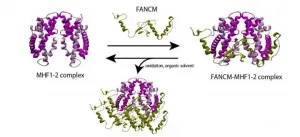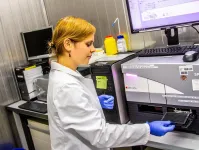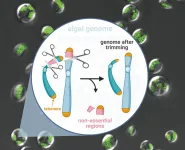Conspiracy theories influence our behavior -- even if we do not believe in them
2021-03-17
(Press-News.org) Not least because of the COVID-19 pandemic, conspiracy theories are more topical than ever. They are reported and discussed in almost all media and communication channels. But what influence do they have on our behavior? Scientists led by behavioral economist Loukas Balafoutas investigated this question in a recently published study. The result: We don't need to believe in conspiracy theories for them to have an impact on us. Merely being confronted with them suffices.
Previous studies have shown that beliefs in conspiracy theories have an influence on the behavior of their adherents. For example, they lead to lower voter turnout or a lower willingness to get vaccinated. For years now, conspiracy theories have been experiencing a real boom - it is almost impossible to ignore them. This has prompted a research team led by Loukas Balafoutas to conduct a laboratory experiment to investigate whether conspiracy theories also have an impact on us when we do not believe in them and are only briefly confronted with them. "Our study shows that subjects who were exposed to a conspiracy theory for just three minutes acted differently in a subsequent behavioral experiment than subjects from the control group," reports Loukas Balafoutas, Professor of Experimental Economics at the Department of Finance at the University of Innsbruck. The researchers were recently able to publish these results in the journal "Economic and Political Studies".
Conspiracy theories change behavior
In the so-called EconLab of the University of Innsbruck, the researchers conducted their experiment before the COVID-19 pandemic. Half of the 144 participants in the study were shown a 3-minute video depicting the 1969 moon landing as a fake. The control group, on the other hand, watched an equally long video about the space shuttle program. Subsequently, the test persons participated in the so-called "money request game". The players were divided into pairs and asked to make a simultaneous integer bid between 5 and 14 euros. Whoever made the smaller bid received the amount of that bid plus 10 euros; whoever made the larger bid received only the amount of the bid. In the event of a tie, both participants received exactly their bid. In this game, the best response to a bid larger than 5 euros from the other participant is to bid exactly one euro less. If the other participant bids 5 euros, the best response is to bid 14 euros. "In this experiment, we found that subjects who had previously watched the conspiracy theory video bid smaller amounts. This shows that these test persons act more strategically. On the one hand, this can possibly lead to a higher profit in the game, but at the same time this approach also carries the risk of incurring a loss," explains Balafoutas. "So our aim here is not to evaluate this behavior as better or worse, but simply to show that people who were exposed to a conspiracy theory shortly beforehand display different behavior than the control group in a subsequent situation that is completely different in terms of content. From this we conclude that the conspiracy theory has an influence on how someone perceives the world and other people," Balafoutas continues.
Trust remains
In another experiment, the so-called "trust game," the researchers tested the extent to which exposure to a conspiracy theory leads to an impairment of trust toward others. In this game, players were divided into pairs. In each pair, both players received 5 euros. One of the players (A) could decide to invest part or all of the amount. The invested amount was tripled and given to the other player (B), who could then transfer part of the money back to player A - but did not have to. Larger amounts invested by A in this game correspond to a higher level of trust. "It is quite a positive message that we did not find any negative influence of the conspiracy theory here. Trust in the other person was statistically the same in both groups. That's important, because in our society we need a certain level of trust for it to function at all," Balafoutas says.
That the scientists studied conspiracy theories in the lab is no coincidence. "As researchers, we don't want to contribute to spreading conspiracy theories into society. Therefore, caution is always required in such studies. They must be carried out in an ethically justifiable manner and must also be approved in advance. It is particularly important to debrief the test subjects after such an experiment," explains Loukas Balafoutas.
INFORMATION:
[Attachments] See images for this press release:

ELSE PRESS RELEASES FROM THIS DATE:
2021-03-17
One of the most vital functions performed by the cells in our body is DNA repair, a task so crucial to our well-being that failing to execute it can lead to consequences as dreadful as cancer. The process of DNA repair involves a complex interplay between several gene pathways and proteins. One such pathway is the "Fanconi anemia (FA) pathway," whose genes participate in DNA repair. FANCM, a component of this pathway, is tasked with the elimination of harmful DNA "inter-strand cross-links," and interacts with another component called MHF in order to function. The importance of the FANCM-MHF complex is well-documented: its loss can result in chromosomal ...
2021-03-17
Hepatitis B virus (HBV) infections are among the major global health problems. Particularly problematic is the high number of chronic courses of the disease, causing the deaths of more than 800.000 people globally every year. So far, there is no therapy to cure the condition. "With the discovery of a new hepatitis B virus in donkeys and zebras capable of causing prolonged infections, we now have the opportunity for a better understanding of the chronic course of the disease and thus also for mitigation or prevention of severe clinical consequences," explains Prof. Dr. Jan Felix Drexler, DZIF ...
2021-03-17
A new study uncovers which cell types can be infected by SARS-CoV-2 due to their viral entry factors. The study also suggests that increased gene expression of these viral entry factors in some individuals partially explains the differences of COVID-19 severity reported in relation to age, gender and smoking status. The study evolved from the Human Cell Atlas Lung Biological Network with main contributions from Helmholtz Zentrum München, the Broad Institute of MIT and Harvard, the Wellcome Sanger Institute and University Medical Center Groningen.
COVID-19 does not affect everyone in the same way. While the coronavirus SARS-CoV-2 primarily ...
2021-03-17
The health of women aged 65 and over appears to be related, in addition to their own socioeconomic characteristics, with that of their partners, as a result of traditional gender norms. This is one of the main conclusions of research led by Jordi Gumà, a researcher at the UPF Department of Political and Social Sciences, conducted in conjunction with Jeroen Spijker, a Ramon y Cajal I3 researcher at the Centre for Demographic Studies of the Autonomous University of Barcelona (CED-UAB), focusing on the case of Spain.
The study, published in Gaceta Sanitaria, analyses the health differences among the Spanish ...
2021-03-17
An international team of scientists from the University of Turku, Finland and PennState University, USA have solved a long-standing mystery of how living organisms distinguish RNA and DNA building blocks during gene expression paving the way for the design of new antiviral drugs. The new insights were published in the journal Nature Communications.
All cellular organisms use two types of nucleic acids, RNA and DNA to store, propagate and utilize their genetic information. The synthesis of DNA is carried out by enzymes called DNA polymerases and is needed to accurately transfer the genetic information from generation to generation. ...
2021-03-17
Our immune system is very successful when it comes to warding off viruses and bacteria. It also recognizes cancer cells as potential enemies and fights them. However, cancer cells have developed strategies to evade surveillance by the immune system and to prevent immune response.
In recent years, fighting cancer with the help of the immune system has entered into clinical practice and gained increasing importance as a therapeutical approach. Current therapies apply so-called immune checkpoint inhibitors. Immune checkpoints are located on the surface ...
2021-03-17
A single-celled alga undergoes genome surgery to remove non-essential parts. This can lead to a most efficient cellular factory for producing sustainable biofuels from sunlight and carbon dioxide.
Researchers from the Qingdao Institute of BioEnergy and Bioprocess Technology (QIBEBT) of the Chinese Academy of Sciences (CAS) have stripped hundred-kilobase genome from a type of oil-producing microalgae, knocking out genes non-essential for it to function. By doing so, they have created a "genome scalpel" that can trim microalgal genomes rapidly and creatively.
The 'minimal genome' microalgae produced is potentially useful as a model organism for further study of the molecular and biological function of every gene, or as a 'chassis' strain for synthetic biologists to augment for customized ...
2021-03-17
RALEIGH, N.C. -- Methane hydrate, an ice-like material made of compressed natural gas, burns when lit and can be found in some regions of the seafloor and in Arctic permafrost.
Thought to be the world's largest source of natural gas, methane hydrate is a potential fuel source, and if it "melts" and methane gas is released into the atmosphere, it is a potent greenhouse gas. For these reasons, knowing where methane hydrate might be located, and how much is likely there, is important.
A team of researchers from Sandia National Laboratories and the U.S. Naval Research Laboratory have developed a new system to model the likelihood of finding methane ...
2021-03-17
Cutting-edge 3D scanners have been put to the test by researchers from the University of Southampton and partners Exceed Worldwide to help increase the quality and quantity of prosthetics services around the world.
The study, carried out within the END ...
2021-03-17
A team of scientists led by Dietmar Krautwurst from the Leibniz Institute for Food Systems Biology at the Technical University of Munich has now identified address codes in odorant receptor proteins for the first time. Similar to zip codes, the codes ensure that the sensor proteins are targeted from inside the cell to the cell surface, where they begin their work as odorant detectors. The new findings could contribute to the development of novel test systems with which the odorant profiles of foods can be analyzed in a high-throughput process and thus could be better controlled.
The ...
LAST 30 PRESS RELEASES:
[Press-News.org] Conspiracy theories influence our behavior -- even if we do not believe in them







